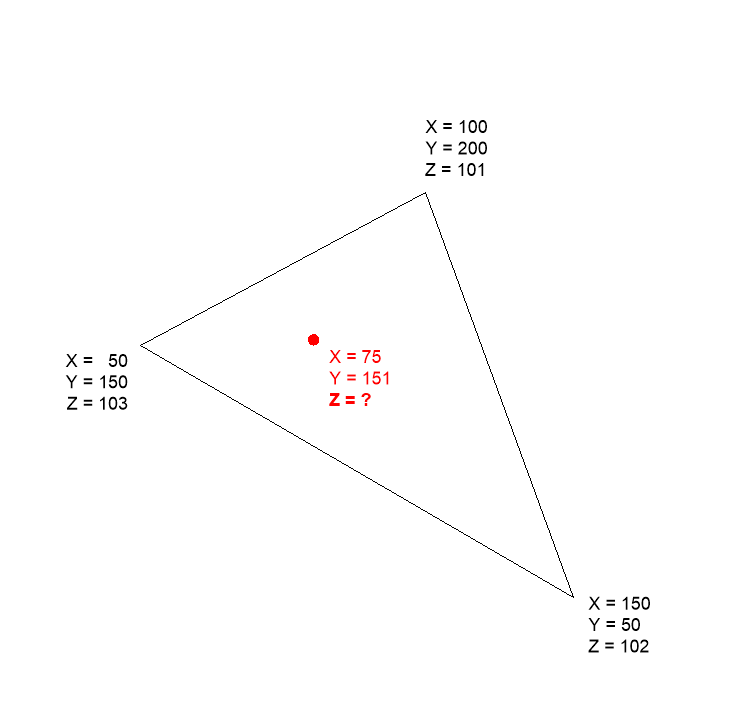C# get z-value from 3dFace according to coordinates
Hi,
I want to write a routine that determines the z-value of any given point according to the x and y values. Any pointes in the right direction would be highly appreciated.
Thanks!
Comments
-
Do you just want to prompt the user to enter a point and enter the coordinate into the command line? You can simply watch the pointer point in the BricsCAD status bar. Why do you need a program?
Indicate in which language you are programming.0 -
please specify your inquiry clearly enough !
You say that " you want to write a routine that determines the z-value of any given point according to the x and y values"..........
The Z-value of a point on a 3DFace or on the plane defined by a 3Dface, provided it is a 3Dface defined by 3 points and not 4 points!
A 4-points 3Dface as a matter of fact defines 2 intersecting planes......................
And you want it probably in C# .NET ????0 -
Yes, I want to write a routine in C#.
Also, the 3dFace is always defined by three points. If I were to do it manually, I would draw a point with a z-Value of 0 and use projectgeometry for example.
I've tried to show the problem with a small picture:
 0
0 -
Think of your inside point not as one point, but two, a vertical ray.
TopPnt = 75,151,200
BotPnt = 75,151,50Create a LineSegment3d (the ray) using those points.
Create a BoundedPlane using the triangle coordinates.BndPln.IntersectWith(RayObj) returns an array of Point3D,
if it's length is 1 element it's the intersection point.0 -
By clicking a point on the XY Plane, you get always a 3D Point on the 3DFACE plane in UCS coordinates
Try the code below :[CommandMethod("L3DFIntersection", CommandFlags.UsePickSet)] public void GetL3DFIntersection() { // just some settings to get the 3D intersection point in the form (68768.76, 67637.67, 67.78) System.Globalization.CultureInfo customCulture = (System.Globalization.CultureInfo)System.Threading.Thread.CurrentThread.CurrentCulture.Clone(); customCulture.NumberFormat.NumberDecimalSeparator = "."; customCulture.NumberFormat.CurrencyDecimalSeparator = "."; System.Threading.Thread.CurrentThread.CurrentCulture = customCulture; // Obtain the necessary objects, Database, editor and transaction Document doc = _AcAp.Application.DocumentManager.MdiActiveDocument; Database db = HostApplicationServices.WorkingDatabase; Editor ed = doc.Editor; using (Transaction tr = db.TransactionManager.StartTransaction()) { PromptEntityOptions prEntOpt = new PromptEntityOptions("\nSelect a 3DFACE:"); prEntOpt.SetRejectMessage("\nMust be a 3DFACE."); prEntOpt.AddAllowedClass(typeof(_AcDb.Face), true); PromptEntityResult prEntRes = ed.GetEntity(prEntOpt); PromptPointResult ptRes = ed.GetPoint("Select a Point :"); _AcDb.Face faceEnt = tr.GetObject(prEntRes.ObjectId, OpenMode.ForRead) as _AcDb.Face; var cs = faceEnt.GetPlane().GetCoordinateSystem(); var o = cs.Origin; var x = cs.Xaxis; var y = cs.Yaxis; var pl = new Plane(o, x, y); Line3d l3d = new Line3d(ptRes.Value, ed.CurrentUserCoordinateSystem.CoordinateSystem3d.Zaxis); Point3d[] iPt = l3d.IntersectWith(pl); ed.WriteMessage("\n Intersection Point : {0}", iPt[0]); tr.Commit(); } }0


